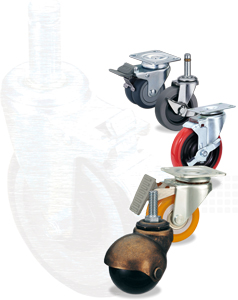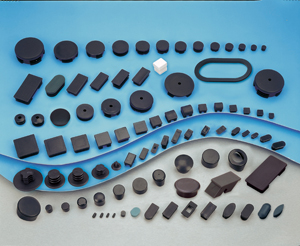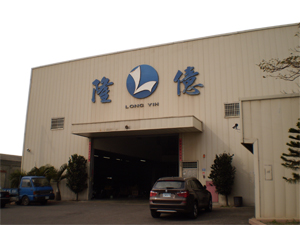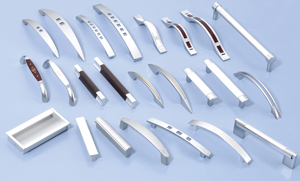Taiwanese Furniture Parts Makers Target Sustainable Development
Efforts are focused on diversifying product lines and vigorously exploring new markets and new customers
2012/06/18 | By Steve ChuangTaiwanese makers of furniture parts are trying to re-create their “golden age” of explosive export growth in the 1970s and ‘80s by developing improved products.
Change is essential, since the island's suppliers face cutthroat competition from low-cost Chinese and Vietnamese manufacturers who are gobbling up shares of the global market for budget furniture by offering cut-rate prices.
Producers in Taiwan are responding to this challenge by diversifying their product lines and vigorously going after new markets and new customers. This article provides a summary of the views which industry insiders shared with CENS.
Market Exploration
Liang Wen-jui, a sales agent for caster-maker Tung Tien Enterprise Co., says that one of the surest ways for his company to secure sustainable growth is by exploring emerging markets.
“We are going to explore emerging markets in Central and South America and the Middle East in 2012,” he explains, adding that the Internet enables traditional companies like Tung Tien to reach new markets such as Brazil easier than before, even if they are thousands of miles away. He is confident that his company can do well in such markets, even if the caster designs and materials used there differ from those in the advanced countries.

This confidence is born of the firm's time-tested professionalism, which is among its biggest competitive advantages. Ever since it was established in the central Taiwanese county of Changhua in 1979, Tung Tien has concentrated on the development and production of casters mainly for residential and office furniture. It can currently turn out six to seven million casters of all kinds each year, 60% of which are exported.
A flexible production mode allows the company to handle original equipment manufacturer (OEM) orders. It is also able to provide problem-solving manufacturing and advisory services to customers from various industries.
“Strong production capability and know-how have helped Tung Tien to stay competitive amid the rivalry from Chinese suppliers,” Liang comments. “Last year some customers came back to us, deciding to re-establish business with our company after a couple of Chinese suppliers went bankrupt in the aftermath of the global financial tsunami.”
The appreciation of the Japanese yen also helped, prompting Japanese customers to greatly increase overseas orders for office furniture and related parts, Liang notes, explaining that “Our casters that have passed SGS testing are much sought-after by Japanese clients, because they believe that quality outweighs price.” This is why orders have come to Tung Tien instead of its Chinese and Vietnamese counterparts.
“We suspended a factory expansion that was planned for 2011 because of economic uncertainty,” Liang reports. “But with our overseas market development plans getting underway, we will likely see stable growth this year.”
Manufacturing Diversification
In the face of the shrinking of the domestic furniture industry, Q.S. Jiang, president of the OHLA Plastic Co., one of the region's three top makers of plastic furniture parts and accessories by output, decided to focus on diversifying his manufacturing operations.
“In the past,” he notes, “plastic furniture parts accounted for 90% of our total revenue. But now we will expand into parts for medical instruments, fitness and sports equipment, machinery, hand tools, and agricultural machines.” In addition to the persistent industrial recession in Taiwan, Jiang says, another reason for the decision to diversify is the weak prices commanded by plastic furniture parts: “A few contract orders have come back to us over the past two years, but the low prices can't assure profitability.”
OHLA has stepped up the development of special plastic parts for the new areas into which the company is expanding, and has already began turning out some parts in cooperation with customers on a joint design manufacturing (JDM) basis. “Customers trust our cutting-edge know-how in the field of plastic materials and services, and that trust will facilitate our entry into these new segments,” Jiang comments.
Founded in central Taiwan's Taichung City in 1993, OHLA is widely recognized for its ability to help clients solve problems encountered during the development of new products. Jiang says that the company participates in the full process of R&D projects proposed by customers, playing an advisory role and helping them to reduce product development and marketability risks to a minimum. If products are to be sold in cold climates, for example, the company will suggest that cold-resistant plastic be used in making parts for them.
The company is also well-experienced in analyzing market methodologies for plastic parts with new specifications and designs, boosting its competitiveness even further. “Our seasoned know-how has enabled us to build up a distinct profile in relation to our rivals,” Jiang claims.
Jiang concedes that the move toward diversification will be difficult, but insists that he will remain resolute. “As we work to maintain our plastic furniture parts business with old customers,” he says, “our company will also work hard to build partnerships with new customers and make the most of our capabilities to satisfy their product-development needs.”

Focus on System Furniture
Asked about how to sustain business development in the sluggish global economy, Nien Cheng-han, president of the Long Yih Hardware Co., answers that his company will focus on cooperation with system furniture manufacturers in an effort to gain short-term growth momentum. Long Yih is a 24-year-old supplier of metal parts and decorations for residential furniture.
“Parts for system furniture generate a higher margin than those for traditional furniture,” Nien explains, adding that handles for system furniture, for example, can sell for NT$20-30 each, while those for traditional furniture command an average of only NT$7-8.
Nien notes that high-margin products require production upgrades to provide the greater flexibility that can assure the stable supply and on-time delivery of parts with different specifications and designs. In addition, he stresses, such products also require more attention to guaranteed quality, because poorly made parts will eventually be locked out of the supply chains of furniture manufacturers.
The president believes that his company, which was established in Changhua County in 1988 and began life by supplying packaging materials, can survive and prosper in this relatively challenging field because of its commitment to quality and customer satisfaction.

Long Yih constantly strives to improve its production capabilities and expand its product range in cooperation with customers. Its catalogue now encompasses handles, slide rails, cabinet glides, hinges, hydraulic hinges, glass door hinges, glass clips, casters for sliding book shelves, hydraulic spring lifts, double roller cabinet door catches, ventilation grilles, sliding door casters, clothes and trousers hangers and racks, necktie organizers, hardware accessories for wardrobe sliding mirror doors, sliding mirror brackets, and other related parts, all available in a variety of materials including zinc, aluminum, steel alloy, copper, iron, and stainless steel.
After years of hard work, Nien stresses, his company is known as a customer-driven manufacturer that has solid OEM business ties with Taiwanese furniture makers “Our proven production flexibility enables my company to handle even rush orders with consistent quality and prompt delivery,” Nien states.
Despite the fierce competition from rivals in emerging countries, Nien is confident that Long Yih can continue surviving and growing in the future. “The industry in Taiwan will not stay in the doldrums forever,” he insists, “because the demand for furniture will always exist. What we have to do now is figure out different ways to revive our growth.”





